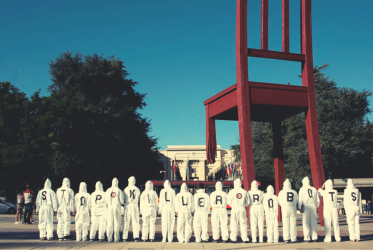Again we mourn the people who died from the atomic bombings of 1945 and extend our solidarity and resolve to those who survive.
The pain of this important anniversary is threefold. There are the shattered families, recurring traumas and unnatural deaths that have affected hundreds of thousands of people of Hiroshima and Nagasaki. There is the fact that, 65 years on, nuclear bombs still threaten humanity and deny a lasting peace. There is also the legacy that since 1945 the world is divided into two camps – a handful of states that assert the right to have weapons of mass annihilation and the majority of states that do not.
Such inequity and division is not the heritage of humanity. The Bible urges us to "choose life" so that all may live. As if in response, 65 years after Hiroshima, more and more people are working to rekindle the vision of a world without nuclear weapons. More than 4,000 mayors from 144 countries have joined the mayors of the bombed Japanese cities in an association called Mayors for Peace. They insist that "Cities are not targets". In several nations, elder statesmen and former military generals have reversed lifelong positions and come out for nuclear abolition. On several continents, parliamentarians, physicians, lawyers and scientists are campaigning with their peers for the abolition of nuclear weapons.
In different countries around the globe people of faith are standing together for a world without nuclear weapons. The World Council of Churches (WCC) and member churches are promoting ratification of a new arms control agreement between Russia and the US, rejuvenation of disarmament forums and reform of NATO’s nuclear policy. The WCC and churches from Australasia to Africa have helped governments establish nuclear-weapon-free zones that now cover 116 countries and more than half the world. The ecumenical community is also preparing for an international convocation in May 2011 in Jamaica on the pursuit of "just peace", a peace where there is no place for weapons that put humanity and the planet at risk.
In 2010, the atomic bomb survivors of 1945 continue to live lives of courage and endurance, witnessing to the hope that no one will ever again suffer as they have suffered. For the first time this year, the Secretary General of the United Nations will honour them with his presence at the memorial ceremonies in Hiroshima. The United States will send an ambassador for the first time also. One hopes that the other nuclear-armed governments might be represented as well.
On August 6th and August 9th we turn our hearts toward the people of Hiroshima and Nagasaki, asking God to bless governments and citizens with new resolve to protect the sanctity of life.
Rev. Dr Olav Fykse Tveit
World Council of Churches general secretary


